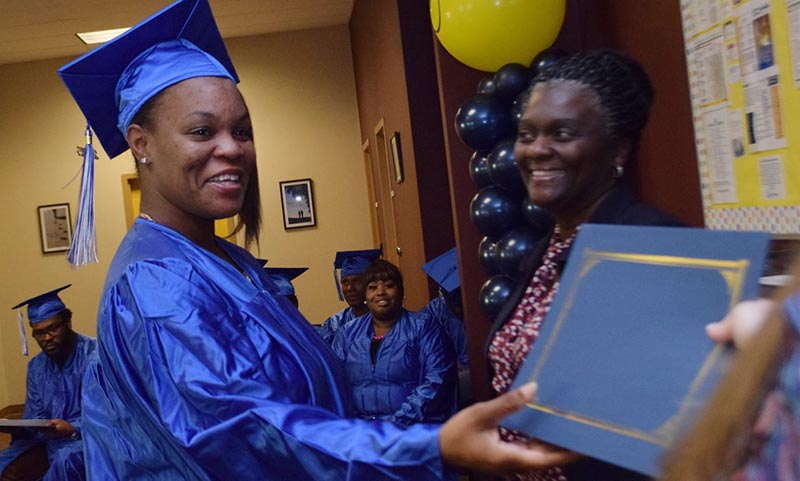
By Jeff Matthews
Originally published by The Town Talk on December 5, 2015
It looked like a typical graduation ceremony, but it wasn’t.
The graduates wore gowns and marched in to “Pomp and Circumstance.” Beaming family members took pictures. There were speeches about great accomplishments and what the future holds. When it was over, the graduates tossed their tasseled caps into the air to celebrate.
What was atypical about the ceremony Thursday was that the graduates were not traditional students. They’re among a group of people that much of society sees in a far different light — they have all recently been to prison or on probation for various crimes.
The 11 graduates were celebrating completion of a three-month program designed to help probationers transition successfully back into society, and hopefully avoid ending up back in prison. The degree they walk away with is the hope of a changed life.
“Whether you’ve been incarcerated or not, we’re all humans,” said Cole Gralapp, district administrator at the Alexandria Probation and Parole Office. “These are people who have made mistakes. They served their time. Should we be treating them like second-class citizens? Should we be ostracizing them, or should we be doing more to welcome them?”
“When I got out of jail, I made my mind up that I did not want to go back to what I was before,” said Lashona Chapman, one of the graduates Thursday. “I was not a good person. I was not a good role model for my kids. I want to be those things.”
Programs like the one that recently launched at the Alexandria Day Reporting Center have been gaining traction as incarceration rates in many areas of the country reach the tipping point.
In the past, the answer to crime has often been to build more jails, spend more money, hand down harsher sentences. More recently, stakeholders from across the political spectrum seem to be coming around to the idea that there is a better way.
“When we started, we heard ‘Re-entry what?’ a lot,” said Candy Christophe, founder of the nonprofit Re-Entry Solutions, now in its fifth year supporting such efforts in the area. “I’m very, very pleased with the progress we’ve made. People are seeing that successful re-entry efforts are needed, especially in Louisiana since we lead the world in incarceration.”
Good news for ‘the world’s prison capital?’
Louisiana’s prison population was nearly 37,000 in August, according to the Bureau of Justice Statistics. It locks up more of its residents per capita than any state, in a country with the highest incarceration rate among all nations.
Numbers like those have earned Louisiana the dubious moniker of “the world’s prison capital.”
But there are glimmers of good news.
The prison population has decreased significantly from its peak of more than 40,000 in 2012. Department of Public Safety and Corrections Secretary Jimmy Leblanc told lawmakers this year that stronger reentry programming has been a major factor in that drop.
In June, the Alexandria Day Reporting Center opened its doors. It’s one of six centers in the state run by private company Geo Reentry Services, which contracts with Louisiana Probation and Parole to provide services ranging from education and job training to life and parenting skills.
Participants report daily for 60 days, then for four weeks in a less intensive aftercare program. The center currently has about 35 participants, but can serve as many as 50 at a time. Some are mandated to go through the program as part of their probation or parole, while others choose to participate.
“We emphasize change,” said Program Manager Cassandra Anderson. “When an individual comes to us, they work with a case manager to develop a behavior change plan, then identify some goals and steps they need to take to reach that. We’re trying to help them make a change in their lives. If an individual doesn’t receive any of these type of services, they’re probably going to be in and out (of prison).”
The nonprofit Re-Entry Solutions, launched in 2010, focuses on three main areas of need for ex-offenders — employment, housing and family restoration. The group was also at the forefront of forming the Cenla Successful Re-Entry Coalition, where anyone interested in the issues surrounding reentry meet to share ideas and resources.
With the added programming now being offered locally in other areas, Re-Entry Solutions is turning much of its efforts toward securing housing for ex-offenders in need.
“It makes more strategic sense for us to focus on housing,” Christophe said. “That seems to be the next essential need.”
The barriers to an ex-offender becoming a productive citizen can be daunting. They have to find a job, and sometimes a place to live. They are often coming back to families who resent and don’t trust them because of past behavior. They may have problems with substance abuse.
But the biggest one, may local stakeholder say, is fear.
“Fear of change, fear of failure, fear of rejection,” Anderson said. “Look at how we view offenders. We categorize them; we lump them into one big ball, and it’s not a good one. They’re scared to ask someone to give them a chance, because so many people won’t. I look at it as investing in people. Why not reach out to your brother or sister and help them be a better person?
“At some point, does a person need to return to incarceration? Yes. But I want to make sure my team and our partners exhaust all our resources first.”
‘It wins at all levels’

Why should you care?
After all, these are people who committed crimes. Why spend energy and resources helping people who turned their backs on society?
Advocates have two answers: It’s the compassionate thing to do, and it’s in your self interest to do it.
“It’s everybody’s issue,” Christophe said. “If we want our communities to be safe and thriving, we have to be caring of each other and start lifting ourselves up. We’re not talking about a handout; we’re talking about a hand extended upward. If you feel re-entry efforts or helping your fellow citizen in Central Louisiana is not your responsibility, that is not wise thinking.”
From a purely pragmatic standpoint, it’s far more financially beneficial to have someone contributing to society than draining its resources.
Locking people up is expensive, and with rising health care costs, it gets more expensive every year.
Contrast the money it takes to keep someone housed, fed, watched and healthy in jail with that person potentially working, paying taxes and buying consumer goods.
That doesn’t even account for the less quantifiable, but equally important, benefits of removing someone from criminal behavior and restoring them to family life, where they can potentially become a positive, rather than a negative, influence on their children.
“When you restore one of these people, the effects multiply,” Gralapp said. “The finances are important, and I feel like this will wind up saving the state a lot of money, but the idea that someone’s father or mother is there, you can’t measure the impact that has. This is something that wins at all levels. It wins with someone who may be more liberal, and it wins with conservatives.”
The thought getting back to her five children is what got Chapman through her four months in jail, where she landed after an abusive relationship turned violent.
Before she was imprisoned, she drank heavily every day. She’s been sober since getting out five months ago.
When she got out, she wanted a job but was scared to look for one. She’s now working part time at a local hotel and looking for other opportunities.
“When I was in jail, all I thought was ‘I miss my kids, get me out of here and Lord help me I’m never coming back,'” Chapman said. “Some people take the attitude, ‘I have to do this or that; I may as well be in jail.’ I didn’t have that attitude. When I was recommended (for the Day Reporting Center program), I was willing to try it. It gives you major support. A lot of people don’t have that support.”
“Everybody is somebody’s somebody,” Christophe said. “I can’t emphasize that enough. We look at these people as less than us, but they’re people just like us. They have families like we do. We all bleed red. We’re all part of this nation and this community. If we want our local neighborhoods to be safer and stronger, we have to help each other become stronger.”
